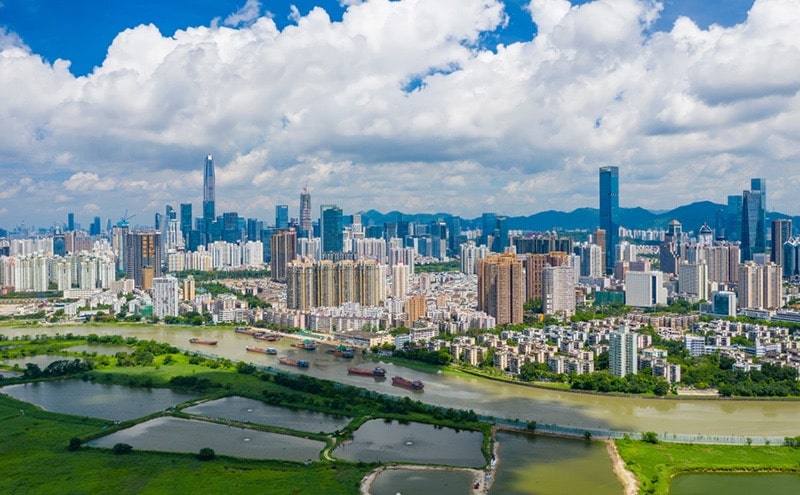Guangdong, Hong Kong and Macao are connected by mountains and rivers, and the three places have a long history of people-to-people exchanges and economic ties. With the opening of the high-speed rail and the opening of the Hong Kong-Zhuhai-Macao Bridge, commuting time in neighboring cities has been saved, making cross-border lifestyles such as studying, working, living, and retiring more feasible.
However, when the political and business circles spare no effort to promote the opportunities in the Greater Bay Area, the public does not seem to respond positively, resulting in a contrast between the government and the public. Will citizens consider developing northward because of this national plan? In particular, the Greater Bay Area takes innovation as its main axis and focuses on youth entrepreneurship. The wishes of young people deserve more attention.
Citizens support participation in the development of the Greater Bay Area
Democratic Thoughts commissioned the Hong Kong Institute of Asia-Pacific Research at the Chinese University of Hong Kong to conduct random telephone surveys every six months and publish the "One Country, Two Systems" Index to regularly track the implementation status of "One Country, Two Systems" and other hot topics. Four rounds of polls have been completed since mid-2017. The last two rounds of polls were conducted in the middle and end of last year. New survey questions were added to investigate citizens' attitudes towards the Guangdong-Hong Kong-Macao Greater Bay Area, allowing us to understand the changes in citizens' attitudes in the past six months.
We first asked citizens about their understanding of the Greater Bay Area. On a scale of 10, the average score increased from 3.85 in mid-2018 to 3.94 at the end of the year. Although the level of familiarity has improved in the past six months, the public’s understanding of the Greater Bay Area is not deep and more publicity is still needed.
We further asked the public whether they support Hong Kong’s participation in the development of the Greater Bay Area. Citizens who expressed support accounted for the majority in both rounds of surveys, with the same perfect score of 10, and the average score dropped slightly from 6.3 points to 6.27 points. Although a decrease was recorded, the overall trend is still in favor, and there is no significant difference between different age groups, proving that the public opinion that young people are generally opposed to the development of the Greater Bay Area is not valid.
If divided by political orientation, the establishment party has higher support for Hong Kong's participation in the development of the Greater Bay Area and is rising. The score increased from 8.1 points to 8.7 points, an increase that reached a statistically significant level. Moderates tend to support it, with scores of 6.4 in both rounds. These two factions, which account for more than three-quarters of the adult population, jointly believe that Hong Kong should participate in the development of the Guangdong-Hong Kong-Macao Greater Bay Area. However, the attitude of non-establishment supporters turned negative, with their score falling from 5.4 to 4.6, shifting from support to opposition. Some of them believe that the Greater Bay Area will weaken Hong Kong’s autonomy and deserves clarification from the government.
Young people have the lowest willingness to go north to the highest
As society begins to explore opportunities in the Greater Bay Area, we try to observe whether citizens will consider living or developing in other cities in the Greater Bay Area. The attached [table] shows that in the latest round of surveys, only 13% citizens will consider it, 13.4% may consider it, but 62.6% will not consider it.
It must be noted that no matter where you are, there are always only a small number of people willing to live, study, work or retire abroad. Therefore, it is not appropriate to draw a conclusion on the number of citizens who are considering going north. However, comparing the two rounds of surveys, there was a slight increase in the number of people who would consider going there, and a slight decrease in the number of people who would not consider going there, gradually tilting towards considering going north.
The willingness of young people (18 to 29 years old) to go north has changed even more significantly. In a mid-2018 survey, only 8.11 TP3T youth would consider moving to other cities in the Greater Bay Area to live or develop, making them the age group with the lowest proportion. Six months later, the young man's attitude changed drastically.
By the end of the year, 14.9% young people would consider going there, the highest proportion in the age group; 48.8% would not consider it, the lowest proportion in the age group. The net unwillingness of young people dropped by 19 percentage points, a statistically significant decline.
The "Outline Development Plan for the Guangdong-Hong Kong-Macao Greater Bay Area" was released in mid-February this year. Our survey was conducted before the release of the "Outline Plan." We believe that the general public does not fully understand the development blueprint for the Greater Bay Area, so they mostly treat it with a wait-and-see attitude.
After the "Planning Outline" was released, CUHK Asia Pacific conducted another survey in March 2019 and found that the number of citizens who "will go" and "will not go" to live or work in mainland cities in the Greater Bay Area was 37.8% and 41.8% respectively. The ratios are close, indicating that the opportunities in the Greater Bay Area are attractive.
There is broad public support for Hong Kong's participation in the development of the Guangdong-Hong Kong-Macao Greater Bay Area. The number of people considering developing in other cities in the region is still small, but it is increasing. Young people occasionally complain about the cramped living space and single career options in Hong Kong. They are highly adaptable and mobile, so it is a reasonable choice to reduce their resistance to return to the mainland for development.
Although turning positive is just a preliminary statement, it is a personal wish to always go north to develop, which is determined by socio-economic factors and has to be put into practice after practical considerations such as career prospects, salary levels, living environment, etc., but in the Greater Bay Area, free movement The lifestyle is undoubtedly one more option for citizens who are willing to explore other opportunities to venture abroad.
Song Enrong is the co-convener (research) of Democratic Ideas and deputy director of the Economic Research Center of the Asia-Pacific Institute of the Chinese University of Hong Kong; Pan Xuezhi is an associate researcher of the Shanghai-Hong Kong Development Joint Research Institute of the Chinese University of Hong Kong.



